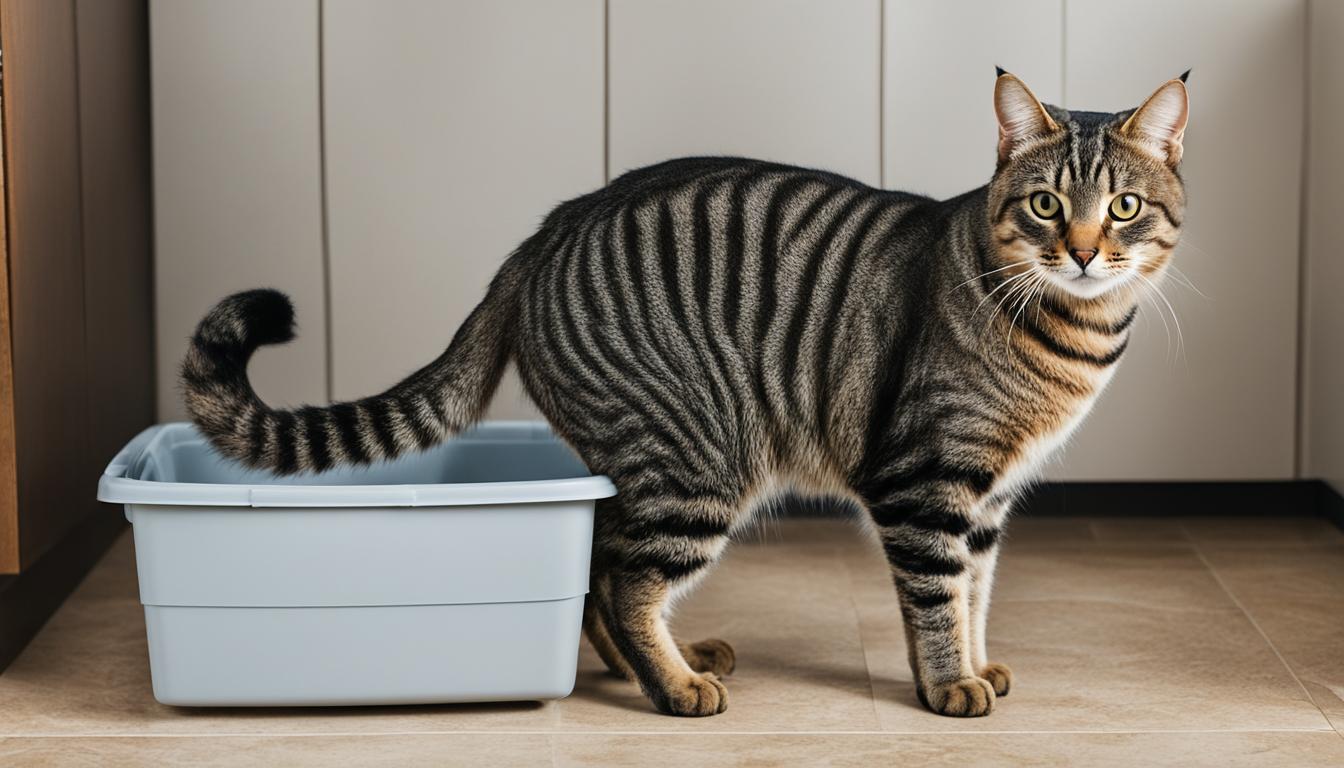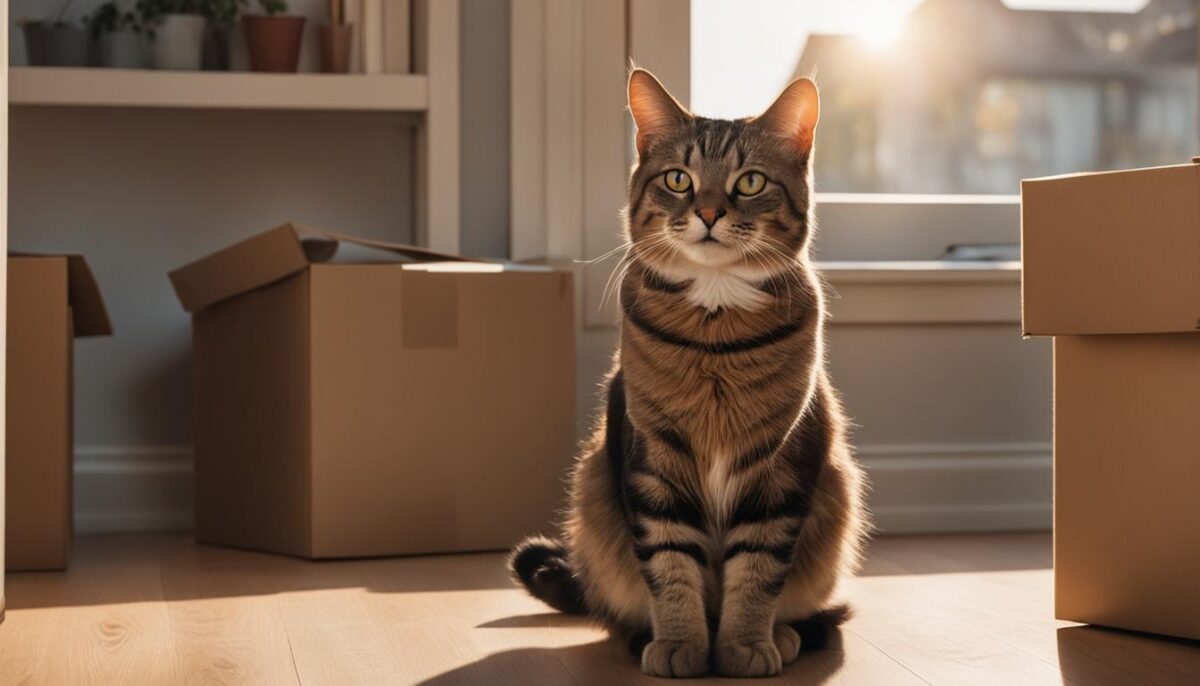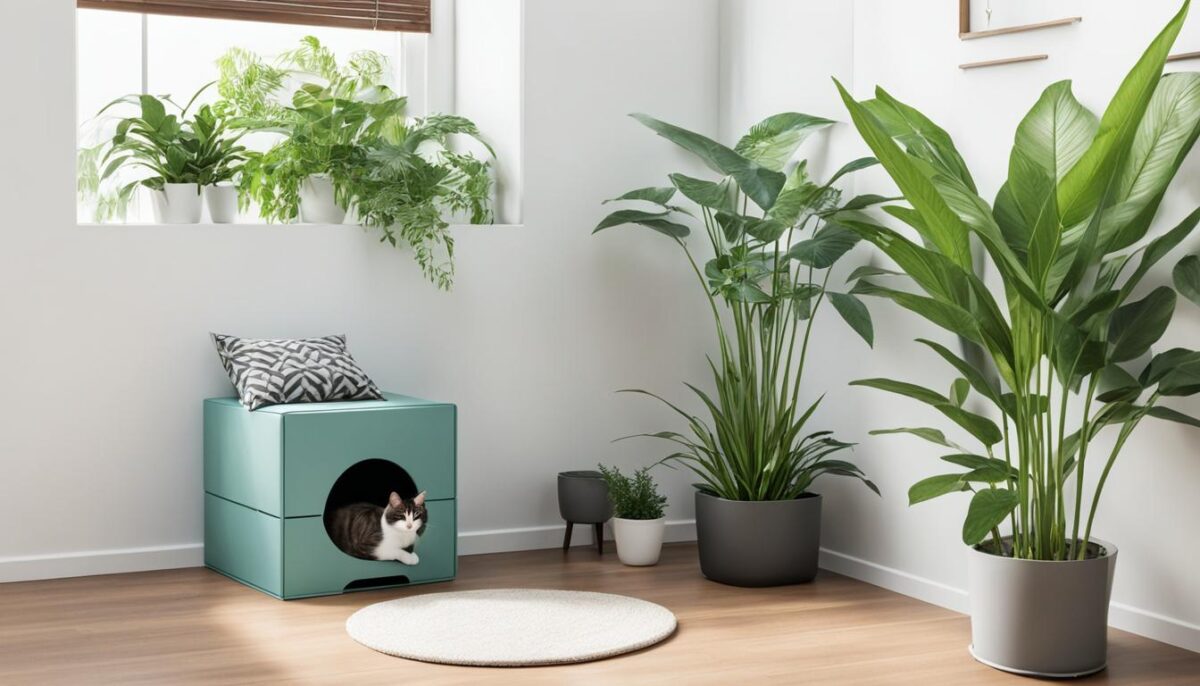Do you find your cat pooping outside of its litter box? This can be puzzling. Cats usually follow their feline habits and use their litter box. But when they don’t, it could be due to several reasons. It’s important to know about cat behavior, litter box problems, and pet health to fix this.
Your furry friend might have a health issue, or maybe something is making them upset or nervous, like changes at home. That’s why if this happens, looking at your cat’s health is a good first step. Taking care of your cat’s litter box can also help a lot, making sure it is clean and in a good spot for them.
By learning more about what could be causing such changes in your cat’s habits, you can help them get back on track. Remember, you are not alone. About 10 out of 100 cats may act like this at some point.
The goal is to help your cat feel happy and safe again. Keeping their box clean and speaking with a vet can provide solutions for you and your pet.
Key Takeaways
- Cats not using the litter box can be a sign of health problems or stress.
- Check their health with a vet visit to rule out any serious concerns.
- Make sure the litter box is clean and in a comfortable place.
- Understand your cat’s behavior and what makes them feel safe.
- Helping your cat can mean changing a few simple things at home.
Understanding Your Cat’s Litter Box Behavior
Have you ever watched your cat and wondered about their daily habits? Cats are well-known for being clean animals that like to bury their waste. Using the litter box is one of those habits that most felines pick up very quickly due to their natural instincts. However, there can be times when they do things a little differently.
The Unique Nature of Feline Habits
Cats have their own personality, which means they also have their own special ways of doing things, like using the litter box. Some cats enjoy a quiet and lonely spot, while others might not mind a more open area. Feline behavior experts suggest that each cat’s litter box usage can tell us a lot about their cat personality.
What Studies Say About Litter Box Issues
Behavioral research
has shown that not all cats follow the same patterns when it comes to the litter box. A big part of understanding why a cat may choose to go outside their litter box involves looking at their environment and daily life. For example, if the litter box is too dirty or placed in a noisy area, your cat may feel uncomfortable. Studies help us create better spaces for cats to feel happy and safe when doing their business.
Remember, your cat is not trying to make you mad by avoiding their litter box. They are simply following their instincts. Learning about litter box usage can help you make sure both you and your kitty are happy.
Why Is My Cat Pooping Outside the Litter Box?
Is your furry friend choosing places other than the litter box for potty time? Don’t worry! Let’s look at why this might be happening. Sometimes, it’s all about their health or how they’re feeling inside.
Potential Health Concerns to Consider
Like humans, cats can feel unwell too. A tummy ache or sore joints can make it hard for them to get to the litter box in time. Here are some health issues that might be bothering your cat:
- Constipation or diarrhea
- Arthritis, especially in older cats
- Kidney problems that make them go more often
If you think your cat is not feeling well, it’s important to take them to the vet. They know just what to do to help your fluffy friend feel better!
Behavioral Factors That Influence Litter Box Use
Cats also have feelings. If things change around them, they might feel stressed and skip the litter box. Here’s what might make them worry:
- New places or too much noise
- A dirty litter box they don’t like
- New people or pets at home
Keeping their litter box clean and their environment calm can help your cat feel safe. When they’re comfy, they’re more likely to get back to good litter box habits!
Tackling Medical Causes for Improper Elimination
When your cat does not use the litter box and makes a mess elsewhere, it can be troubling. It’s not just about extra cleaning for you, but it can also be a sign that your furry friend is not feeling well. Cats with medical conditions often have problems using their litter box. So, it’s important to understand that improper elimination can be linked to health issues. It’s part of taking care of their feline health.
Just imagine that sometimes, when people don’t feel good, they may not make it to the bathroom in time. Well, the same thing can happen to cats. If your kitty is having accidents, it might be time for some vet care. The vet is like a doctor for cats, and they can figure out what is making your cat sick.
You might be surprised to learn that cats can have tummy troubles, like constipation or diarrhea, or even achy joints from arthritis. They can also have trouble “peeing” because of urinary problems. These are all medical conditions that can make a cat stop using the litter box.
Remember, a visit to the vet can help your cat feel better and get back to using the litter box properly.
Here’s a list of some common medical issues that could be making your cat avoid the litter box:
- Constipation
- Diarrhea
- Arthritis
- Gastrointestinal problems
- Urinary tract infections
By checking in with a vet, you can help your cat feel better and avoid these potty problems. The vet will know what treatments can help your cat get better. So, if you notice that your cat isn’t using the litter box, take action and get them some help!
| Medical Issue | Signs to Look For | How the Vet Can Help |
|---|---|---|
| Constipation | Struggling to go, hard poop | Special food, medicine |
| Diarrhea | Runny poop, going more often | Checking food, giving medicine |
| Arthritis | Limping, trouble jumping | Medicine, comfy beds |
| Gastrointestinal Issues | Not eating, throwing up | Diet changes, tests |
| Urinary Problems | Going often, pain when peeing | Medicine, diet changes |
Take good care of your cat and watch out for any signs that they’re not feeling well. If you care for your cat with love and get the right vet care, you can help them stay healthy and happy!
Changes in the Home and Your Cat’s Stress Levels
Hey there, friend! Have you noticed your cuddly cat acting a bit strange after a big change at home? Cats, just like people, can feel cat stress when things are different around them. Let’s chat about what happens when your furry buddy has to deal with new environments or when new family members come into the picture.
Moving to a New Environment
Imagine you’re going on a big adventure to a brand-new place, but you didn’t get to decide to go. That’s pretty much what your cat feels when it moves to a new environment. Everything’s different – the smells, the sights, and the spots where they liked to curl up and snooze. This can make them feel unsure and lead to some messy situations, like pooping outside the litter box.
Introducing New Family Members or Pets
Now think about this: you’re chilling at home and suddenly, someone new comes in to stay – maybe a baby, a grandparent, or even a new pet! That can be a big deal for your cat too. These kinds of household changes can shake up their world. Cats need time to get used to new family members, and they might need a little extra love while they adjust.
- Keep things calm for your cat when new people come around.
- Give your cat some quiet space to relax in.
- Slowly introduce your cat to any new furry friends.
Remember, your kitty is a part of your family. Being patient and kind will help them settle into the new situations and feel happy again in no time!
Proper Litter Box Maintenance and Cleanliness
Making sure your litter box is clean is super important. A tidy box helps stop icky smells and keeps your cat happy and healthy. Think of it like this: you like a clean bathroom, right? Well, so does your cat! Here’s how to keep everything neat:
- Daily scooping – Get rid of the clumps each day.
- Warm water and mild soap – These are your friends for deep cleaning the box at least once a week.
- Unscented litter – Some kitties don’t like strong smells. Keep it simple with unscented litter.
Remember to wear gloves and maybe even a mask when you’re cleaning, so you don’t breathe in any of the dust. A fresh box means odor control and cat hygiene are top-notch, which makes for a happy home!
If you keep up with litter box maintenance, your furry friend will thank you. And, hey, your nose will probably thank you, too, because who wants a stinky house? Not you, and definitely not your cat!
Addressing Your Cat’s Environment and Comfort
When setting up your home for your cat, it’s important to make sure they have a comfy spot just for them. Let’s talk about how to pick the best spot for their litter box and why it’s so important to keep things calm and private. This helps your cat feel safe and may stop them from going potty outside their litter box.
Choosing the Right Litter Box Location
Finding a private area for cats to place their litter box is key. You want to pick a quiet space where they won’t be bothered by a lot of noise or people walking around. Think about a place where you can set up their litter box that’s out of the way, like a rarely used bathroom or a quiet corner in a room.
The Impact of Household Noise and Activity
Noise can really stress out cats. They like peace and quiet, especially when they’re using their litter box. Try to find a spot that’s away from loud TVs, music, or busy areas where people are always moving around. A calm and quiet space makes a big difference in environmental comfort for your kitty.
Here’s a cool way to think about where to put the litter box. Imagine you’re a cat, looking for a spot where you can go to the bathroom in peace. You wouldn’t want to be in the middle of everything, right? That’s how your cat feels too!
| Good Spots for Litter Box | Not-So-Good Spots |
|---|---|
| Quiet laundry room | Near busy kitchen |
| Low-traffic guest room | In a hallway with lots of foot traffic |
| Secluded corner in a home office | Next to a loud living room TV |
Remember these tips, and you’ll create a quiet space and a private area for cats that can help keep them happy and using their litter box the right way. Just like us, cats need to have their own special spot where they can feel cozy and relaxed.
Behavioral Strategies to Encourage Proper Habits
Hey there! Is your kitty making you play “find the poop” more often than you play with them? Well, you can teach your furry friend where to go potty with some cool tricks. Behavioral modification and cat training are key. Let’s talk about how using things like deterrents can help, and how picking the perfect litter can make a big difference in your cat’s potty behavior.
Using Obstacles and Deterrents Effectively
Are you finding little surprises behind the couch or in your shoes? It’s time to make those no-cat-zones less inviting! You can put things in their way like double-sided tape or aluminum foil. Or use safe sprays that smell yucky to them but not to you. This way, they’ll start thinking, “Yuck! I don’t wanna poop here.”
Selecting the Correct Litter Type for Your Cat
Just like how you have a favorite blanket, your cat has litter preferences too! Some like their litter to be super soft, while others might want it clumpy so they can dig like they’re on a treasure hunt. Check out this neat list of different kinds of litters and what might make your cat’s paws do a happy dance:
| Type of Litter | Bonus Points for Kitty | Why It’s Cool |
|---|---|---|
| Clumping | Easy to scoop | It makes clean-up a breeze, so there’s always a fresh spot for your cat. |
| Scentless | No strong smells | Perfect for cats who turn up their nose at perfumes. |
| Recycled Paper | Soft on paws | Your cat can be eco-friendly and have a comfy place to go! |
| Crystals | Super absorbent | Keeps the litter box dry and your cat happy. |
Remember to keep it consistent, because cats are like us when we go to our favorite restaurant only to find out they changed the menu – not cool, right? So, once your kitty likes a type of litter, try to stick with it. Your cat will thank you by using their litter box instead of your laundry basket. Winning!
Conclusion
When your furry friend starts pooping outside their box, it’s like a mystery you need to solve. It’s super important to figure out why they’re doing this. Sometimes, they might not feel well, and a trip to the vet is the best way to check on their health. The vet can help you know if there is a medical reason for their new pooping place.
Keeping the litter box clean and putting it in the right spot helps a lot too. Cats like their bathroom to be nice and tidy, just like you. Also, making sure your home is a happy place for your cat can make a big difference. When they feel safe and comfy, they are more likely to use the litter box. If changes at home make them upset, understanding and helping them can bring back good pooping habits.
Remember, you are not alone in this! If you need more help or advice, your local vet or animal hospital is there for you. They can give you feline guidance and veterinary assistance to get your cat’s pooping behavior back to normal. By working together, you can solve most litter box issues and keep you and your cat happy.
FAQ
Why is understanding my cat’s litter box behavior important?
Understanding your cat’s behavior is essential to address litter box problems that may stem from various causes, including pet health issues, stress, or individual feline habits.
What could be causing my cat to avoid using the litter box?
Your cat might be avoiding the litter box due to several reasons such as health issues like constipation or arthritis, environmental stressors, changes in the household, or behavioral factors related to discomfort with the litter box itself.
How can I tell if my cat’s litter box avoidance is due to a medical condition?
Litter box avoidance can sometimes signal a health problem. Watch for other symptoms such as changes in appetite, visible discomfort, or changes in frequency or consistency of stool, and consult your veterinarian for a professional diagnosis.
How do stress and changes at home affect my cat’s litter box use?
Cats are sensitive to changes in their environment. Stressful changes, like moving to a new home or the arrival of new pets or family members, can disrupt their routine and lead to litter box avoidance.
What are some best practices for litter box maintenance?
Best practices include cleaning the litter box daily, using unscented litter, performing regular deep cleans with mild soap and warm water, and ensuring the box is in a convenient, quiet, and private location.
What should I consider when selecting a location for my cat’s litter box?
Choose a location that’s quiet, private, and away from busy household areas. Ensure it’s easily accessible at all times and free from loud noises or disruptions that may deter your cat.
How can I use behavioral strategies to redirect my cat back to the litter box?
Incorporate deterrents near the areas where your cat has been inappropriately eliminating, maintain consistency with litter type, and provide your cat with a comfortable and appealing litter box setup to encourage proper habits.
Why is it important to consult a veterinarian if my cat is pooping outside the litter box?
Consulting a veterinarian is crucial to rule out any underlying medical conditions that could be causing your cat’s litter box avoidance. Early intervention can lead to a quicker resolution and better health outcomes for your pet.
Can changing the type of litter help with my cat’s litter box problems?
Yes, cats can be particular about the type of litter they use. Experimenting with different types, such as clumping, non-clumping, or different textures, may help you determine your cat’s preference and encourage proper use of the box.
How can I manage my cat’s stress to improve litter box habits?
Managing stress in cats involves providing a stable environment, paying attention to your cat’s needs, minimizing changes, offering plenty of playtime, and possibly using pheromone diffusers to create a calming atmosphere.


